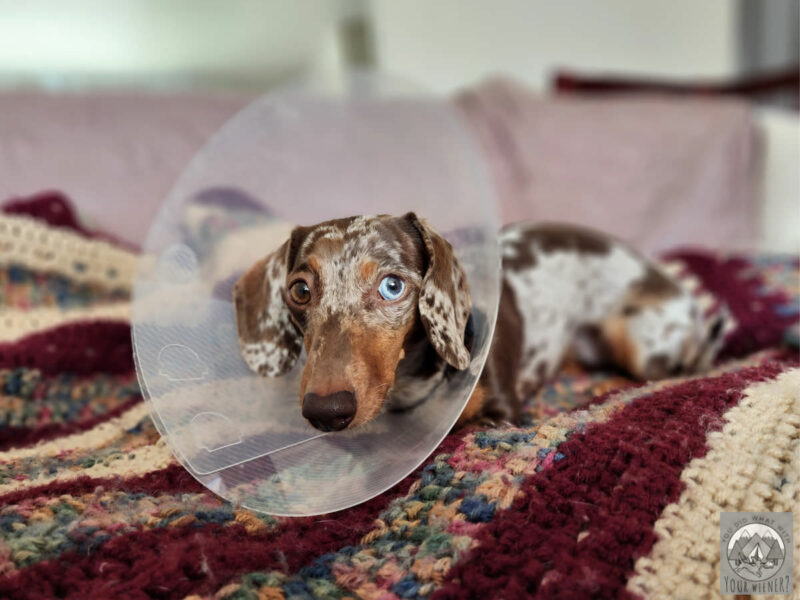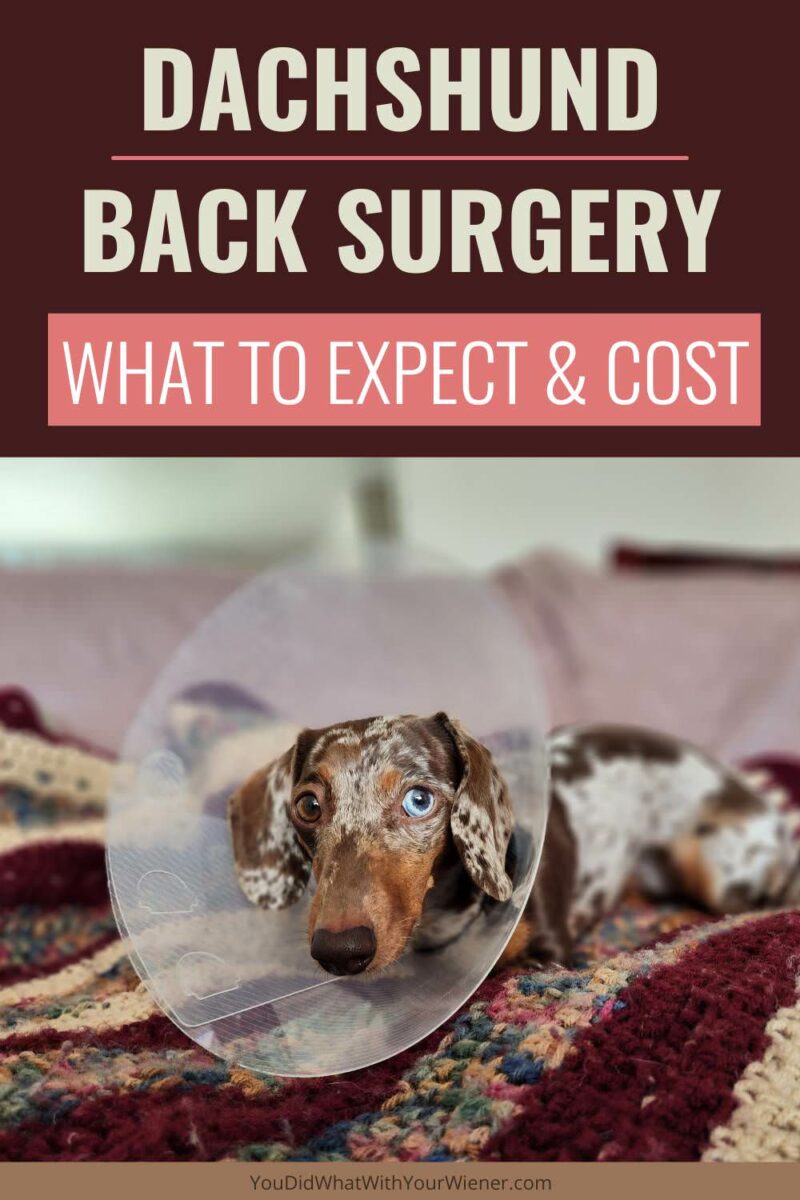Dachshund Back Surgery – Description and Cost
If your Dachshund has suffered a back injury and been diagnosed with Intervertebral Disk Disease (IVDD), surgery may be recommended.
In this article, I explain what IVDD is, when surgery will be recommended, and what to expect, including the cost and chance of recovery.
What is Intervertebral Disk Disease (IVDD)?
I wrote in depth about this disease, which afflicts approximately 98% of Dachshunds to some degree, in my article The Truth About Dachshunds and Back Problems.
But I want to touch on IVDD here in case you haven’t read it.
IVDD is a genetic disease causes the cushion-like discs between the vertebrae of the spine to prematurely become brittle and calcified.
These disks, which normally act as shock absorbers and help to support the spine, can eventually degenerate to the point they become damaged and rupture.
When this happens, the goo inside the disk leaks out and can press on the spinal cord or nerves, causing pain, weakness, paralysis.
When this happens to your Dachshund, back surgery may be recommended to relieve this pressure and restore feeling and mobility.

When is Back Surgery Recommended for a Dachshund?
Whether or not your veterinarian recommends surgery in response to a disk rupture depends on their experience, the degree of disk injury, and the chance of recovery with such surgery.
In order to determine whether your Dachshund’s disk rupture is bad enough to require surgery, your normal veterinarian may send you to a neurologist.
The severity of your Dachshund’s disk rupture will be graded on a scale from 1 to 5, with 1 being the mildest cases and grade 5 being the most severe.
At grades 1 and 2, conservative (non-surgical) treatment is often the initial recommendation, at least until, and if, it becomes clear that your Dachshund is not healing on their own.
If your Dachshund’s back injury is grade 3-5, surgical treatment is most often recommended as it gives the best chance for recovery.
What Happens During Dachshund Back Surgery?
The goal of back surgery is to remove pressure on the surrounding spinal cord and nerves, which is the cause of pain and paralysis, in hopes of restoring function of the affected limbs.
The surgery is performed under general anesthesia and involves making an incision in the dog’s back or neck to access the affected area of the spine.
According to UC Davis Veterinary Medicine, the most common surgery done to remove disc material from around the spinal cord is called a hemilaminectomy.
During this procedure, the spine is approached through an incision in the middle of the back and using a special drill, a window is made in the bone of the vertebra immediately above the disc.
The disc material underneath the spinal cord can then be gently removed.
In addition to the hemilaminectomy, a veterinarian will often perform what is called fenestration.
This procedure, done in hopes of reducing the possibility of a nearby disks rupturing, involves cutting a small window in the outer, fibrous ring of the disk and removing the material in the center.
Other procedures than may be performed include:
- Pediculectomy – a procedure to untangle and relieve pressure pedicle (spinal) nerves.
- Ventral slot – performed when the disk problem is in the neck, this procedure involves drilling holes in the vertebrae to relieve pressure.
After the surgery is complete, the dog will be closely monitored by the veterinary team for several hours to ensure they are recovering well from anesthesia and the surgery.
They will likely need to stay in the hospital for several days to a week to receive supportive care and manage pain.
Will My Dachshund Be Back to Normal After Back Surgery?
The answer to “Will my Dachshund recover with back surgery?” is not necessarily and not right away.
After surgery and discharge from the hospital, your Dachshund will need to have their mobility strictly limited through crate rest for several weeks, or more, to allow the spine to heal properly.
Although my own Dachshund did not require surgery, I’ve shared in the experience of several back surgeries with Dachshunds I have walked, dog sat, and that belong to people in my Dachshund club.
In all of the cases, the Dachshunds needed 4-6 weeks of crate rest following surgery to fully heal. But some may take longer.
Physical therapy, and other alternative treatments such as cold laser, may also be recommended to help the dog regain strength and mobility.
But the truth is that it’s never a 100% guarantee your Dachshund will return to normal after surgery.
While the chance of a full recovery increases when the disk rupture is mild (below grade 3), and surgery is performed right away, ideally within 48 hours, the chance of surgery totally fixing your Dachshund is approximately 50% to 90%.
And, in rare cases, the spinal cord is so damaged that it starts to die – called myelomalacia.
What Does Dachshund Back Surgery Cost?
The cost of Dachshund back surgery can vary depending on a variety of factors, including:
- Geographic location
- The severity of the dog’s condition
- The type of surgery required
- The specific veterinary hospital or clinic performing the procedure.
On average, the cost of Dachshund back surgery can range from $4,500 to $10,000.
I live on the West Coast near Seattle and everyone I know paid closer to $10,000 for their Dachshund’s back surgery.
This cost may include the pre-surgical evaluation and testing, anesthesia, the surgical procedure, hospitalization, pain management medications, and any necessary follow-up care.
In addition to the direct cost of the surgery, there may also be additional expenses such as pre-surgical consultations, radiographs or other imaging tests, physical therapy, and ongoing management of the dog’s condition.
The most common pre-surgery imaging is an MRI, which is necessary to determine exactly which disk, or disks, should be operated on.
If the MRI is not included in the surgery quote, an MRI could cost an additional $2,000.
These figures are, of course, the total cost and not the out-of-pocket expense if you have pet insurance (before a back injury occurs).
Most pet insurance companies that cover hereditary or congenital conditions (remember, IVDD is genetic) will cover 60% to 90% of the spinal surgery cost.
However, with most companies you will have to pay the bill up front and then be reimbursed.
The only exception I know of is Trupanion pet insurance, which will often pay the veterinarian directly if the procedure is pre-approved.
It is important to discuss the cost of Dachshund back surgery with the veterinary team in advance of the procedure, and to consider factors such as the dog’s age, overall health, and expected outcome when making a decision about whether to pursue surgery.
Can a Dachshund Recover from a Herniated Disk Without Surgery?
Given the high cost of surgery, and the fact that there is no 100% guarantee that it will work, you may be wondering if your Dachshund can recover from a back injury without it.
In my experience, surgery is never something a veterinarian recommends just to “upsell” and increase their profits (a common criticism of veterinarians).
If your vet recommends spinal surgery for your Dachshund, it’s best to do it immediately, as the chance of recovery increases the sooner it’s done.
However, know that euthanasia is not your only option if you choose not to do surgery.
I have heard of many paralyzed Dachshunds recovering with conservative treatment alone, even if surgery was presented as having the best outcome.
However, it can take a much, much longer period of crate rest to recover – often 6-12 months – and there is a definite risk that a Dachshund may never walk again.
Just because a paralyzed Dachshund can’t walk normally, doesn’t mean they can’t move around and have a good quality of life, though.
I know of many Dachshunds with permanently paralyzed back legs that have lived a long and happy life getting around in a wheelchair.
It is important to be real with yourself though when making your decision because caring for a dog with special needs, including possibly needing to have their bladder and bowels expressed every few hours, takes a lot of effort and dedication.
And permanent paralysis can lead to other medical issues in the future.
Not everyone is emotionally, physically, or financially in a place where they can or want to provide that kind of care and that’s ok.
Final Thoughts
Whether it happens suddenly or slowly over a few days, it’s very upsetting when your Dachshund injures their back and becomes partially or fully paralyzed.
But there is hope for recovery and a new normal, which may range from “the way it was” to a new, manageable normal.
Treatment for Intervertebral Disk Disease, or IVDD, may include surgery and it’s best to do if recommended.
In this article I have attempted to help ease your mind by explaining what happens during surgery, what to expect after surgery, and preparing you for the high-cost of back surgery.
But I understand there may be reasons you are unwilling or unable to opt for a surgical treatment – most notably, the less than 100% chance of recovery and financial duress.
Therefore, I also tried to summarize what to expect if you skip the surgery and try conservative treatment instead.
Note: regardless of the degree of recovery, since IVDD is a genetic disease that deteriorates the spinal disks, there is a chance that a different disk can rupture and cause an injury in the future.
No matter which type of treatment you choose, I wish you and your Dachshund the best of luck!


About the Author
Hi, I’m Jessica. I’ve been studying the Dachshund breed since 2007, owned 3 of my own, and shared in the lives of thousands of others through their owner’s stories. When I’m not sharing what I know on this blog, you can find me hiking, camping, and traveling with my adventurous wiener dogs.
